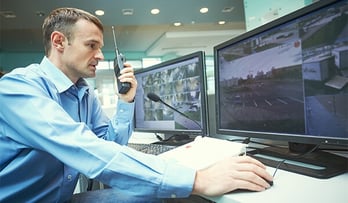There are few security challenges like those that arise on a casino floor. The presence of money and the excitement of the patrons, mixed with alcohol, can fuel erratic behavior and increase the risk of liability.
Casinos are always busy, but as business becomes more successful, the potential for cheating and disorderly conduct increases. In order to successfully address these challenges, security and surveillance departments need to be equipped with up-to-date casino security technology that supports best practices.
Taking a proactive approach to security—rather than a reactive one—is key to ensuring safe and legal play on the floor.
Human Behavior
High stakes create a greater desire for patrons to attempt to infringe on safe and legal play. Even the automated games in a casino provide an opportunity for theft or foul play to occur. Patrons might steal unattended winnings at a nearby slot machine, for example, or a banned individual might attempt to enter the casino or trespass onto the property.
In order to conduct surveillance and investigations efficiently, surveillance teams must have the ability to report or flag someone in a centralized system and notify the appropriate parties. Fully integrated casino surveillance software can manage, track and report on subject data. When supported with add-on modules like license plate recognition, this software can alert surveillance teams as soon as a banned person attempts to enter the premises.
Employee Theft
Incidents of internal theft are common and occur across all areas of the casino—from food and beverage to cage operations and table games. Paper-and-pen reporting is time consuming and hinders your team's ability to accurately notice, report, file, and analyze trends or patterns on the casino floor. Having limited resources greatly increases the likelihood of unnoticed losses. Acting on internal theft requires proper intelligence: minimize internal losses by ensuring your team spends less time writing reports and more time analyzing them.
Reporting on Risk
With an integrated reporting solution, information can be shared and collected between departments or users, ensuring detailed and consistent reports and legal documentation. Centralized reporting software improves operational efficiency across departments, reduces costs, and minimizes exposure to liability.
Additionally, many gaming operations implement reporting systems to adhere to Gaming Commission requirements. Having a fully-integrated system in place ensures compliance with industry standards and government regulations.
Trend Monitoring
Having the ability to analyze data and identify trends is key to increasing surveillance team bandwidth. Implementing software that offers automated reporting, an easily searchable database, and the ability to track both subjects and personnel will enable surveillance and security teams to keep their attention on the casino floor.
Ultimately, though, this is only one benefit of reporting software. To increase safety and offer full protection of casino assets, you need a centralized, fully-integrated platform that complements existing surveillance strategies. The most comprehensive solutions not only simplify the reporting process but also ensure compliance, reduce the likelihood of incidents, and lower overall costs for the casino.
More from the blog
View All Posts
Enhancing Casino Security: The Advantages of Integrating Facial Recognition with Records Management Systems
Read More
Changing Your Incident Reporting Software: Why an Increase in Reports May Not Mean an Increase in Crime
Read More
The 3 Biggest Challenges to Securing Casino Floors
Read MoreSubscribe to email updates
Stay up-to-date on what's happening at this blog and get additional content about the benefits of subscribing.